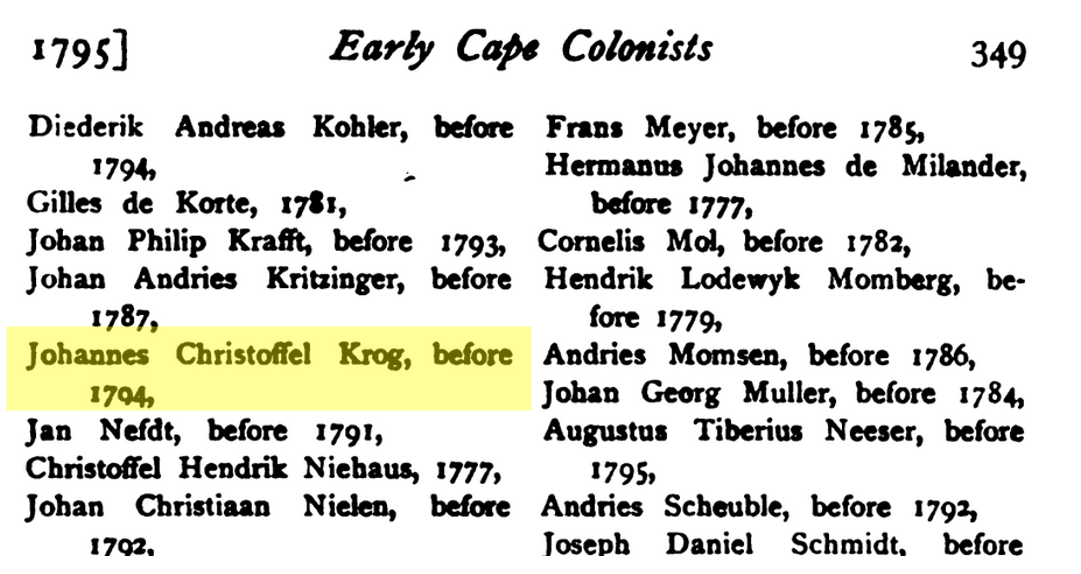
Johannes Christoffel Krog South Africa 1795
In the latter years of the eighteenth century, when Europe was in turmoil and empires clashed on distant shores, a young man named Johannes Christoffel Krog—born around 1778 in the windswept lands of Mecklenburg-Strelitz in Germany—harboured ambitions that stretched far beyond his birthplace. Son of Johann Christoffer Krog and Catharina Margareta Bandelow, he carried with him not only the weight of his family’s traditions but also a restless yearning to venture into the unknown. In a world where borders were shifting and allegiances were in constant flux, Johannes’s destiny was soon to be rewritten by fate and war.
At the age of fifteen or so, the call of the sea and the promise of adventure led him to enlist with the Dutch East India Company (VOC). On November 7, 1793, he embarked on a journey aboard the ship Hertog van Brunswijk, taking up the demanding role of third master—one charged with the noble responsibility of ensuring the health and well-being of his crewmates under harsh conditions. The vast expanse of ocean, the unpredictable weather, and the ever-present threat of conflict were his constant companions as he sailed with a fleet that connected Europe to the mysterious lands of the East Indies.
However, destiny had plans that no careful chart or seasoned navigator could predict. In 1795—a year marked by the upheaval of the French Revolutionary Wars—the geopolitical landscape of the Cape Colony shifted dramatically. The once-stalwart VOC outpost at the Cape of Good Hope, vital to ships making the long voyage between Europe and the Indies, was caught in the crossfire of competing imperial ambitions. As French forces forced the transformation of the Dutch Republic into the Batavian Republic, Great Britain moved swiftly to curb any potential threat by seizing control of crucial maritime routes and ports.
It was during this turbulent period that Johannes found himself aboard the VOC ship Makassar. On the fateful morning of June 14, 1795, as the Makassar navigated the seas off the St. Helena coast near Cape Town, the British fleet—embodied by the daring explorer George Vancouver commanding HMS Discovery—closed in. Unaware that the world he had long known was now at war with the emerging Batavian Republic, the Makassar was captured in a sudden and chaotic encounter. In the ensuing disorder, Johannes, along with others who served on the ship, was forcibly “removed” from the vessel, an act reflecting the tense suspicions and political prudence of the British authorities in this new era of conflict.
With his life, skills, and loyalties suddenly in flux, Johannes Christoffel Krog had little choice but to accept a fate he had never imagined. Despite his initial plans to serve under the auspices of the VOC and sail to far-off lands, the capture of the Makassar altered his course irrevocably. On July 3, 1795, he found himself setting foot on a land that was both foreign and fraught with the remnants of VOC power—the Cape Colony. Instead of bitter defeat, this twist of fate became the crucible in which a new identity was forged.
In the years that followed, the Cape Colony itself was transformed. The British takeover, cemented after the 1795 Battle of Muizenberg—a brief but decisive conflict that heralded the end of VOC rule—ushered in a new era for the region. Amidst this backdrop of revolution and realignment, Johannes began to build a quiet, resilient life. He eventually settled in Swellendam, a modest township some 300 kilometres east of Cape Town, where the rugged beauty of the South African landscape seemed to echo his own indomitable spirit.
In 1803, in this unexpected haven, Johannes Christoffel Krog found love and stability when he married Hester Maria Krog (née Maree) in Swellendam. Their union not only cemented his personal legacy but also marked the humble beginnings of the Krog family line in South Africa—a lineage that would carry the name forward through generations as a testament to courage, adaptability, and the unpredictable hand of destiny.
For decades, Johannes’s life intertwined with the evolving story of the Cape. VOC records of his service note curious details—such as the scarce financial remittances to his family and his removal under politically charged circumstances—yet these fragments only hint at the broader narrative of a man caught between empires and historical turning points. His journey from the troubled coasts of Europe to the sunlit, expansive vistas of South Africa stands as a metaphor for the constant reinvention required by men during times of upheaval.
When Johannes Christoffel Krog passed away in 1855 at the age of 77, his life had come full circle—from a young man at sea to the respected stamvader (progenitor) of the Krog name in South Africa. His story, filled with unexpected turns, conflict, and eventual renewal, remains forever inscribed in the annals of history as a reminder that sometimes the paths we are forced to take lead us to destinations far beyond our wildest dreams.




